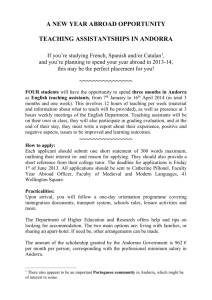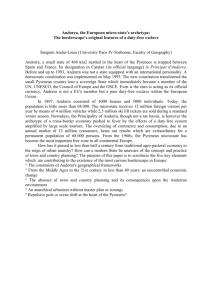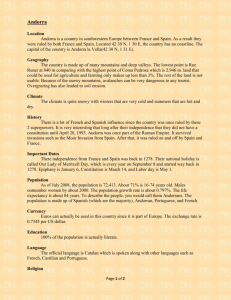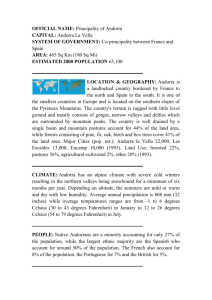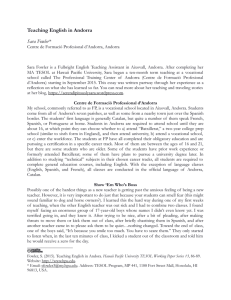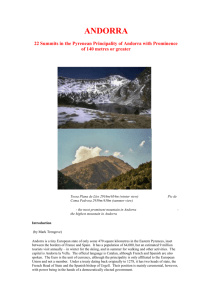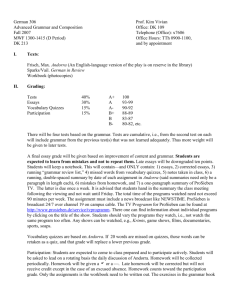The 3 rd Session of the Conference 09 th June 2011, 09:00 – 10:30
advertisement
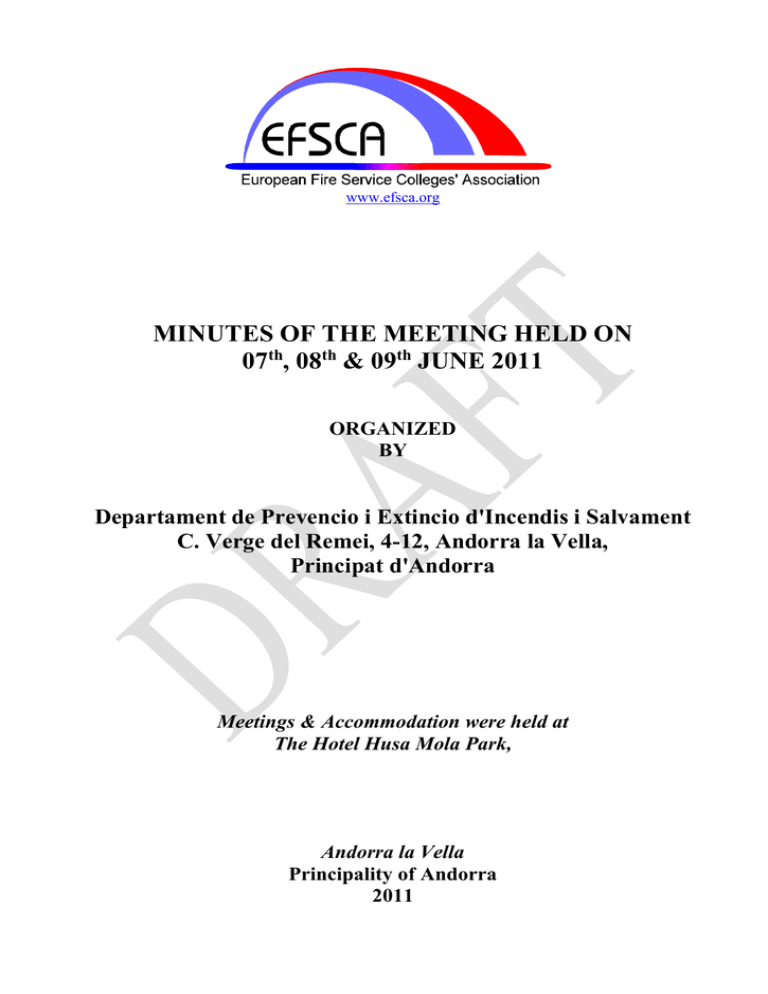
www.efsca.org MINUTES OF THE MEETING HELD ON 07th, 08th & 09th JUNE 2011 ORGANIZED BY Departament de Prevencio i Extincio d'Incendis i Salvament C. Verge del Remei, 4-12, Andorra la Vella, Principat d'Andorra Meetings & Accommodation were held at The Hotel Husa Mola Park, Andorra la Vella Principality of Andorra 2011 DELEGATES AND REPRESENTATIVES ANDORRA Jordi Farré CANELLES (Deputy Director) Pere de la TORRE (Responsable for Training’ Organization) Xavier Nuez SILVA (Trainer) Department de Prevenció i Extinció d’Incendis i Salvament - DEPEIS BELGIUM Luc FAES Kasterlee Fire Service Chief Christiaan ROETS (Chief of Training Department) Federal Public Service Home Affairs - National Centre of Expertise for Civil Protection BULGARIA CZECH REPUBLIC Radoslav Hristov KARTOV (Deputy Dean) Faculty of Fire and Emergency Safety of the Academy of Minister of Interior Radim PALOCH (Director) Fire Service College Vojtěch VRANAY (Lecturer/EFSCA Treasurer) Fire Service College DENMARK Flemming ANDERSEN (Head of Educational and Training Division) Educational and Training Division of Danish Emergency Management Agency (DEMA) Henning JENSEN (Head of College) Emergency Service College, Danish Emergency Management Agency (DEMA) ESTONIA Margus MÖLDRI (Director) Public Service Academy, Rescue College GERMANY Martin SEELAND (Deputy Head Technical Operations) Fire Service Academy Hamburg (Feuerwehr Akademie Hamburg) ICELAND Elísabet PÁLMADÓTTIR The Fire Service Technical College – FSTC, Reykjavik HUNGARY Paula MALECZKY (English language teacher) Zsolt HORVAT (Teacher) Hungarian Disaster Management Training Centre, Ministry of Interior 2 LATVIA Eriks STANKEVICS (Deputy Director) Iveta VORZA (Head of Applied Research Unit) Fire Safety and Civil Protection College LITHUANIA Valdas KRULIKAUSKAS (The Chief of Firefighters Training School) Vaida JASENAITE (Person in charge for International Relations) Firefighters' Training School, Fire and Rescue Department under MI Republic of Lithuania NETHERLANDS Wim BECKMANN (Head of Fire Academy) Jaap MOLENAAR (Trainer/Advisor in the Fire Academy) Netherlands Institute for Safety – NIFV (NIBRA) POLAND Jerzy WOLANIN (Deputy Rector - Research) Tomasz ZWEGLINSKI (Head of International Co-operation Department) The Main School of Fire Service ROMANIA Florin NEACŞA (Dean) Ionel-Alin MOCIOI (University Lecturer, International Relations Manager/EFSCA Secretary) Police Academy “Alexandru Ioan Cuza”, Fire Officers Faculty SLOVENIA Milan DUBRAVAC (Head of Fire School) Andrej BIAGGIO (Training Instructor) Training Centre for Civil Protection and Disaster Relief SPAIN Maria Rosa CALVO (Head of Specialized Training Department) Jordi SANS PINYOL (Head of Research) Escola de Bombers, Institut de Seguretat Publica de Catalunya Firefighters School, Institute for Public Safety of Catalonia UKRAINE Mykhaylo KOZIAR (Rector) Taras RAK (Head of Department – lecturer) Lviv State University of Vital Activity Safety UNITED KINGDOM Stephen COPLEY (Business Development Director) Fire Service College Moreton-in-Marsh 3 LECTURERS ANDORRA Ms. Neus VILA (Senior Consultant) Ms. Elisa FITÉ (Founding Partner) Andorran Company Opció – Recourses Humans Joan Carlos RECASENS CABISCOL(Director of DEPEIS) Department de Prevenció i Extinció d’Incendis i Salvament Oscar López MOLINA Sots Official, member of the CISAIKAR, member of the Group Mountain Rescue from the fire brigades of Andorra Samuel DURÓ Official pilot at HELIAND FRANCE Major Xavier STINGLHAMBER Chief of the Firestation of Foix & National technical advisor for rescue dogs Captain Jérôme SALLES (Deputy Chief of Training Service) Adc. Pierre MUNTANER SDIS Pyrénées-Orientales HUNGARY Cpt. Zsolt HORVARTH Disaster Management Training Centre – DMTC SPAIN Miguel SEGUI BUENAVENTURA (Chief of South Area) Jose Luis LEGIDO REVUELTA (Chief of North Area) Fire Service of the City of Madrid Jordi SANS PINYOL (Industrial Engineer, Inspector of the Fire Service Department, Research and Cooperation Area) Institut de Seguretat Pública de Catalunya, Barcelona ATTENDEES ANDORRA Xavier BARBADO Juanan JEREZ Jaume SANCHEZ DEPEIS, ANDORRA 4 1 The Program of the 2011 Annual Meeting – International Conference “Training for Emergency Response in Hard Accessible Areas” & General Assembly, Departament de Prevenció i Extinció d’Incendis i Salvament – DEPEIS, Andorra la Vella, Andorra, 07th-09th June 2011 7th June - Tuesday 12:00 - 20:00 18:30 - 20:00 20:00 - 22:00 Arrivals at Barcelona airport and transfer to Andorra by bus at: Hotel Mola Parc 4* Escaldes Engordany ANDORRA Collecting of accreditation cards at the hotel (possibility to access to Caldea; swimsuit is required) EFSCA Board meeting Dinner in the hotel Dress code: Casual 8th June - Wednesday 07:30 - 08:30 08:30 - 09:00 09:00 - 09:30 10:00 - 10:30 10:30 - 11:00 11:00 - 11:30 11:30 - 12:00 12:00 - 12:30 12:30 - 13:00 13:00 - 14:00 14:00 - 15:00 15:00 - 19:00 20:00 - 23:00 Breakfast in the hotel Dress code Uniform/Smart Flag raising / Group photo Welcome speeches to delegates and presentation of the 2011 EFSCA Conference Speeches: EFSCA’ President – Mr. Wim Beckman Deputy-Director DEPEIS – Mr. Jordi Farré Canelles Minister of the Interior of the Andorran Government – Mr. Marc Vila Amigó 1st Presentation 2nd Presentation Coffee-Break 3rd Presentation 4th Presentation 5th Presentation Lunch Dress code: Casual Relax Visit the “Central Fire Station” and exhibition and the “Casa de la Vall” Free time for shopping and other OFICIAL DINNER in the hotel Dress code: Smart 9th June - Thursday 08:30 - 09:00 09:00 - 09:30 09:30 - 10:00 10:00 - 10:30 10:30 - 11:00 11:00 - 11:30 11:30 - 12:00 12:00 - 12:30 Breakfast in the hotel 1st Presentation 2nd Presentation 3rd Presentation Coffee-Break 4th Presentation 5th Presentation Explaining workshop Dress code: Uniform/Smart 5 12:30 - 13:00 13:00 - 14:00 14:00 - 15:30 15:30 - 17:00 20:00 - 22:00 Workshop Lunch EFSCA General Assembly President’s Report Secretary’s Report Treasurer’s Report New EFSCA Secretary election New members Other issues (e.g. change in the Constitution) Presentation of Latvia for next EFSCA Assembly Hand over medals Passing the EFSCA flag to Latvia Closing of the General Assembly by the President Board Meeting Dinner in the hotel Dress code: Casual 10th June Friday 07:30 - 08:00 Breakfast in the hotel Delegates Departure/Transfer to Barcelona Airport 2 Opening of the Annual Meeting & Conference Program Presentation 08th June 2011, Andorra la Vella, Principality of Andorra 08:30 – 09:30 All members participating to the 2011 EFSCA annual meeting joined together for the EFSCA Flag raising. The event took place in the square situated in front of the Mola Parc hotel and the flag was raised in the tunes of Anthem of firefighters from Andorra. The event was followed by a group photo of all participants to the annual meeting of EFSCA. Then, the delegates were invited to enter in the conference room for welcome speeches and for the start of the 2011 Conference works. Welcome speeches of the annual meeting from Andorra, in 2011 1st Speech – Mr. Jordi Farré Canelles, Deputy Director of the Departament de Prevenció i Extinció d’Incendis i Salvament – DEPEIS of the Government of Andorra 2nd Speech – Mr. Wim Beckmann, The President of the EFSCA 3rd Speech – Mr. Marc Vila Amigo, The Minister of Interior of the Government of the Andorra Principality President of EFSCA Speech Welcome! Honoured minister Bila Amigo, chairman, distinguished members of the European Fire Service College’s Association, On behalf of the EFSCA, it is my great privilege an honour to welcome you all to this international EFSCA- conference. First I would like to thank minister Bila Amigo very much for his support for this conference, without that our conference here in Andorra would not have been possible at all. I 6 think I may speak for all of you, that we are all very pleased to be here in this lovely country of Andorra and to discover that this country is not only big in emergency response but also in hospitality. Special thanks to the bombers of Andorra, not only because they jointed the EFSCA with great enthusiasm, but also for the fact that they were willing to be our host country right away. Thank you very much for that. And believe me, it takes quite some courage to be the host country after the very successful and perfect organized conference of last year in Barcelona! Rosi, Jordi and your team, thank you so much for being our host last year, you did a perfect job. Honored minister, chairman, distinguished members, problems in our countries are, due to the economic crises serious, very serious. Safety problems threats are nevertheless as big as ever, or even bigger, I’m afraid. It means less money to solve them, it means, as I analyzed the situation in my home country, that we have to be more creative, that we need more innovations, that we have to do our jobs more effective and smart, to deliver the same service level and safety standards to our population. Maybe EFSCA can help by exchanging ideas, good practice and new concepts. May this conference be useful for all of us After the speeches, Mr. Jordi Farré opened the EFSCA Conference of 2011, with the subject “Training for Emergency Response in Hard Accessible Areas”. He presented also the program of the Conference and the Chairmen for each session. The Conference has been divided in 4 Sessions, as follows: Wednesday, 08th June 2011 1st Session – 10:00-11:00 10:00 - 10:30 1st Presentation: “Rescue Dog Training and Professional Career”, Major Xavier Stinglhamber, Chief de Fire station of Foix (F), National technical advisor for rescue dogs. 10:30 - 11:00 2nd Presentation: “Working Model Based on Empirical Research Projects as Part of Training and Operational Training”, Official’s Miguel Segui Buenaventura & Jose Luis Legido Revuelta, Fire officials, Chief of area (South and North) of the fire service of the City of Madrid (E). 2nd Session – 11:30-13:00 11:30 - 12:00 3rd Presentation: “Train the Trainer Workshop: A Successful FrancoAndorran Experience”, Ms. Elisa Fité, Senior Consultant and founding partner of the Andorran Company Opció Recourses Humans from 1997 to date, developing as Director responsible for all technical projects and formations made by the company. 12:00 - 12:30 4th Presentation: “The Training of the Group’s Dive Rescue Fire Brigades of Andorra”, Mrs. Alain Moreno & Xavier Font, Sots Official’s Chief & Member Group Dive Rescue from fire brigades of Andorra. 12:30 - 13:00 5th Presentation: “Training for Response and Rescue at Hard to Access Incident Scenes in Hungary, by the Special Rescue Vehicles of the National Training Centre and the Budapest City Fire Department”, Captain Zsolt Horvath, Disaster Management Training Centre, Hungary. Thursday, 09th June 2011 3rd Session – 09:00-10:30 09:00 - 09:30 1st Presentation: “European Projects in Fire Safety”, Mr. Jordi Sans, Industrial Engineer, Inspector of the Fire Service Dpt., Research and Cooperation Area of the Institut de Seguretat Pública de Catalunya (E). 7 09:30 - 10:00 10:00 - 10:30 2nd Presentation: “CISAIKAR”, Mr. Oscar Lopez, Sots Official, member the CISAIKAR, member of the Group Mountain Rescue from fire brigades of Andorra. 3rd Presentation: “Training for Emergency Response in Ravines”, Captain Jêrome Salles, Deputy Chief of Service Train des Pyrénées – Orientales (F). 4th Session – 11:00-11:30 11:00 - 11:30 4th Presentation: “Helicopter Rescue Training”, Sr. Samuel Duró – Official pilot at HELIAND. 3 The International Conference “Development of a Virtual Interactive Network Among the Fire Service Training Centers” 3.1 The 1st Session of the Conference 08th June 2011, 10:00 – 11:00 1st Presentation Major Xavier Stinglhamber, Chief of the Fire Station of Foix from France & National technical advisor for rescue dogs – “Rescue Dog Training and Professional Career” 1950 – Swiss - first country using dogs for rescue ANENA – 1971 1986 – CISA – 1992 Search & rescue dogs Operator. France: - 140 avalanches R-T, Sécurité Civile - 15-20 Firefighters teams - 20 Police teams - 20 Military teams. Rubbles SAR dogs – G.N.R.- Cynotechnique / 150 teams - Rubble SAR and missing person SAR Questage - Sectorization Recycling - every 5 years – Valabre. Questions: - Wim Beckmann, The Netherlands: costs 400 € in 1971& 3000 € - Mr. Jordi Sans, Spain: “Do you think that is possible for a dog to detect the accelerant products (substances), in case of ARSON?” Answer: The Police is in charge for this. - Milan Dubrvac, Slovenia: “Do you have Training of the dogs and trainers for traveling by helicopters?” Answer: Yes, we do this! 2nd Presentation Fire officials Miguel Segui Buenaventura & José Luis Legido Revuelta, Chiefs of areas (South and North) of the Fire Service of the City of Madrid, Spain – “Working 8 Model Based on Empirical Research Projects, as Part of Training and Operational Training” - Recycling education System; - Tunnels Experiments; - Leonardo da Vinci; - Spanish Fire Fighters Association. Questions: - Mr. Jordi Sans, Spain: “Volunteers Fire Fighters in Catalonia training/ or Part Time Firefighters?” Answer: There is a very important number of volunteer Fire Fighters in Catalonia, most of them are non-paid fire fighters but they receive an small amount of money to promote their practices. Anyway, the part-time fire-fighter model is not still properly working in Spain. - Mr. Alin Mocioi, Romania: “Do you use real testing materials ?” Answer: We are performing real fire practices in unoccupied old buildings. These tests have also an investigation intention and we try to put together scientific approach with empiric validation of computer fire simulation and real training for fire-fighters. We use real furniture and others as controlled test combustible materials (liquid fuel pools, wood pallets, wooden boards, polyester foam…..). We also combine natural ventilation profiles to create different fire scenario situations. - Mr. Vojtech Vranay, Czech Republic: 1. “How many persons you can train on a year?” Answer: We are trying to create a continuous developing Project and use it to train firemen from different fire departments. We expect to perform approximately 20-30 essays/tests per year, with the participation of 8 to12 new fire-fighters per essay/exercise (we keep always the recording, coordination and safety roles inside the project responsible team). 2. “How many time you need to prepare 1 exercise?” Answer: It depends on the type of test/exercise. We have an arrangement with the local civil protection organization that help us in all the logistics needed. Usually, we have to work on the preparation of each exercise (that will end in less than one hour) about two or three days (six hour/day) - Luc Faes, Belgium: “How many people you need for experiments/exercise?” Answer: Is the same group in all experiments, from the Spanish Firefighters Association. In further development we want to increase the number of participants of different FD, but we must be sure that they can participate with the adequate level of knowledge and safety conditions requirements. In the test model that we are working now on, we need a minimum group of 12 people in order to cover the different objectives: Thermal image recording group, real image recording, work/attack group, support/simultaneous group, SOS group, safety control group, coordination supervisor, pump operator - Tomasz Zweglinski, Poland: “The tests are standardized?” Answer: Yes they are. These kinds of real tests in real structures are not so standardised like laboratory tests, but we try to control the different aspects or development factors to create good scientific documentation and conclusions: Fuel source, quantity and location, ventilation profiles, temperature and radiation measures-recording (thermocouples and Thermal camera), fire fighter intervention (safety, command and control procedures), post-fire computer simulation,….. 9 3.2 The 2nd Session of the Conference 08th June 2011, 11:30 – 13:00 3rd Presentation Ms. Neus Vila and Ms. Elisa Fité (Senior Consultant and founding partner of the Andorran Company Opció Recourses Humans from 1997 to date, developing as Director responsible for all technical projects and formations made by the company), Opció Company (Human Resources) – “Train the Trainer Workshop: A Successful Franco-Andorran Experience” Questions: - Christian Roëts, Belgium: “How did you avoid the focus of documents or to not overcome 20’ times?” Answer: We use different systems and methods to control time and we connect them to the purpose of each course or training. - Tomasz Zweglinski, Poland: 1. “The e-learning system did not have the “no face to face” disadvantage?” Answer: In our opinion with the e-learning system you can study in depth Knowledge but you can’t study enough people's abilities or behaviour . We believe that in Firefighters trainings we need to practice a lot and we are not sure that e-learning system is the best way for achieve a global learning. It can be a perfect system to introduce some concepts but it stays insufficient. 2. “Did the evaluation is 4h long and is recorded?” Answer: We don’t remember very well that question but if you ask it for the tribunal evaluation made during the FOR 2, we don‘t record it. We use to record strategic evaluations where we need to observe in detail abilities. - Valdas Krulikauskas, Lithuania: 1. “Do You use the training for different type of trainers?” Answer: Yes, we do, that system was though in a first time for the French Firefighters, but it has been developed for different other professions, a lot for the financial workers or other different sectors. - Rosa Calvo: 1. “How do you make sure that these people get to the seminar?” Answer: In the French experience we did create a regulation It has been established, in the French experience that with the Pedagogic reform, the great majority of the professionals involved with the Training System should follow those different seminars according to their category. 2. “Could a FF teach a medical assistant?” Answer: Yes, if he is an expert on his abilities or knowledge, and he has assimilate the rules of training the trainers he will teach a medical assistant with a high level. Affirmation – Catalan Firefighters: Recruiting the personnel - Jordi Farré: Affirmation - “Is it a model that could be used for all schools!” 4th Presentation Joan Carlos Recasens – Director of DEPEIS (Department de Prevenció i Extinció d’Incendis i Salvament), Andorra Principality – “The Training of the Dive Rescue Group of Andorra Fire Brigades” 1. Andorra Presentation 10 2. Dive Rescue: 1st team 1985 – 3 people - The access to the group, - Training - Dry suit? - Theoretical book + Book dives + Individual - Caves immersion – every year – fatalities Questions: Alin Mocioi, Romania: “Who’s accessing, fire fighters or from outside the system?” Answer: firefighters. Stephen Copley, United Kingdom: 1. What gas you use at 60m? And for 120m?” Answer: “At 60m - mixed gas. And for 120m – training is limited to 60m and the gas is – Trimix, in case of more than 60m.” 2. “Which tables you use: French/Spanish?” Answer: “French tables adapted to the label of the lake based on the...” 5th Presentation Cpt. Zsolt Horvarth – Disaster Management Training Centre - DMTC, Hungary – “Training for Response and Rescue at Hard to Access Incident Scenes in Hungary, by the Special Rescue Vehicles of the National Training Centre the Budapest City Fire Department” SAR - part of Defense Forces. 3.3 The 3rd Session of the Conference 09th June 2011, 09:00 – 10:30 6th Presentation Jordi Sans, Industrial Engineer, Inspector of the Fire Service Department, Research and Cooperation Area of the Institut de Seguretat Pública de Catalunya, Barcelona, Spain – “European Projects in Fire Safety” – “RACO” and “RECERCAT” – Google / Library of Documents Projects: - Multicom 112 – communication modern tool - Firecomp – Put together all the computers for chief commanders - Life-APTB - Gamma – EC- simulation program for emergency - SAFE-T – Tunnels - RED – Reinforce, Rescue’s, Resilience - COIM – Best, BeSeCu – Behaviour, Security and Culture – still working E-fire proposal could become a lifelong learning platform Affirmation added by Mr. Alin Mocioi, Romania: We will start today the first steps to add it. We’ll build a Forum on the association website, where we can share training on “core business” established by the workshop groups. Xavier Barbado, from Andorra, proposed to build, in time, an EFSCA Label 11 7th Presentation Mr. Oscar López Molina, Sots Official, member of the CISAIKAR, member of the Group Mountain Rescue from the fire brigades of Andorra – “Mountain Rescue Teams or Mountain Rescues with the CISAIKAR Experience Debate” 1948 (Wilder Kaiser) ICAR. For EFSCA: Technical Committees/Groups 30 countries in EFSCA: Members A & Members B Categories GRIM from Andorra is member A since 2010 - Statistics IKAR – CISA – ICAR – You can find it on the website - Field sessions – Zermatt 2009 8th Presentation: Captain Jérôme Salles (Deputy Chief of the Training Service) & Adc. Pierre Muntaner – SDIS Pyrénées-Orientales (Feux des Fôret) – “Training for Emergency Response in Ravines” Not specialized firefighters (S.P. non-specialisés) Training of Specialized Teams Helicopters from Securité Civile Questions: 1. If exist a gas licking from the car and, also, a fire risk, how do you proceed – What is the procedure? (S’il existe un coulement des essences de la voiture et, aussi, le risque d’incendie – comment vous procédé, Qu’elle est la procédure ?) 3.4 The 4th Session of the Conference 09th June 2011, 11:00 – 11:30 Mr. Samuel Duró – Official pilot at HELIAND – “Helicopter Rescue Training” Questions: Cpt. Jerôme Salles, France “Why in Andorra?” Oscar Lopez “Do night vision exist?” The presentations has been distributed to all members attending this meeting by pendrive and will be possible to be downloaded from the website of EFSCA. 12 WORKSHOP: Mr. Wim Beckmann, the President of EFSCA, presented the purpose and the objectives of the Workshop and, also, how the work groups will be organized. The President started with a set of Questions - What is an actual problem? - Where am I looking for right now? - Innovations, new solutions, new methods, new programs for… - What are we doing? Observations: Themes: - Gap between needs and themes that are presented, themes are more or less coincidences. - Presentations: very high quality, questions possible but often inactive, not always brought in relation to the knowledge, already. Virtual offices must be created on the forum of the www.efsca.org . Feedback for Workshop Stephen Copley – Is a good way to progress in EFSCA future! The Working Groups: 1. Czech Republic, Belgium, Bulgaria, Denmark 2. Germany, Iceland, Slovenia, Estonia, Netherlands, Spain 3. Romania, Lithuania, Hungary, Latvia 4. UK, Andorra, Ukraine, Poland The President concluded asking all groups to answer to few questions, so as to identify the main common subjects to be developed further in the next years (needs and strong points). The Questions are as follows: 1. What themes are actual in your country, on what domain are there interesting innovations/ new developments? (Short description please) 2. On what domain/ on what theme in your country are there any needs? What would help you? Examples: comparing training methods – comparing used protocols-used techniques for fire, tunnel, HAZMATs, organization of educational system-costs and figures-demands for volunteers etc. 3. On what domain/ theme do you think is your country expert/ ahead? (short description please) 4. Are there themes/ domains that are very urgent, should have priority, according to the hole group? Explain, please! 13 4 THE 2010 EFSCA GENERAL ASSEMBLY Schedule of the G.A. 09th June 2011: - Layout of the program – Secretary of EFSCA - President report - Secretary report - Treasurer report - Presentation Iceland: Fire Service Technical College - Voting for the new member - Signing the Constitution - Election for a new Secretary: - Presentation of Latvia, as 2012 annual meeting organizers - Medals handover President Report First of all, I would like to say thank you very much to all the speakers of the presentations yesterday and today. It made the program inspiriting, interesting and varied. Furthermore I would like to express my great appreciation to the team of Andorra form the very warm welcome and there great hospitality and the perfect organization of this congress. I also would like to thank Alin, our secretary for doing a superb job, being secretary and president at the same time. Without his support and special efforts he made I’m not sure that EFSCA would still exist. Alin, thank you very, very much for that. A president report is quite an issue, being president for such a short time, A special period also, in times of a Worldwide economic crisis. As I mentioned yesterday, this crises makes it very hard for some countries to keep attached to our organization. People are moved from one position to another, suddenly jobs don’t exist any longer, good point of contact are lost.. For at least 3 country’s the actual state of their membership is even unknown at this moment. At the other hand, Andorra joint the EFSCA, Iceland is a candidate member today. As I earlier today pointed out, I hope that we together are able to find ways to be an active organization, also in future that can really help our member countries with new content, innovations and the results of research. The expertise in this association is enormous. Let us be aware of all the experts in our countries and in our organizations. Let’s find ways to bring it together and be an important and active platform for intensive cooperation and exchange. Therefore I kindly ask you for your help, EFSCA needs your contribute! Secretary Report 4 Board Meetings since the last annual meeting, in Barcelona, Catalonia – ISPC : 21st April 2010 – ISPC, Mollet del Valles, Catalonia 1 unconventional meeting - 15th March 2011 – on the Internet 12th April 2011 – DEPEIS, Hotel “Mola Park”, Andorra la Vella, Andorra 18th May 2010 – DEPEIS, Hotel “Mola Park”, Andorra la Vella, Andorra Main Subjects of the Board Meetings: Issues about the EFSCA Conference and General Assembly organization, in 2011, in Andorra (Andorra la Vella) by the DEPEIS: The Subject of the Conference The Guide to organize the annual meeting Persons to be invited as presenters Workshop organization Cultural and Social Program 14 Transport of the delegates from Barcelona to Andorra Financial support of EFSCA for the organizers Elections for the new Secretary of EFSCA EFSCA financial situation and expenses Our new Internet website www.efsca.org Structure: Main page with latest news, conferences and events About us – including Constitution Boards Minutes of meetings EFSCA Diary – all institutions presentation Links Contact details Forum – in the future Our new Secretary e-mail box – secretary@efsca.org Our new Facebook page – EFSCA Europe How to improve the EFSCA activity and how to raise the dynamism of our association: research activities – building Consortiums, workshops EFSCA participation in Interschutz 2010 – Leipzig, Germany (Mr. Franz Petter - VGBF) – A0 Poster of EFSCA – Franz represented EFSCA, as a former member , helped by Mr. Tomasz Zweglinski from Poland Travel costs to be supported by EFSCA Budget for the members of the Board Raising the financial support of EFSCA for the organizers of annual meetings to 70 % Raising the annual fee for the countries members of EFSCA Medals Situation: Awarded: 10 Gold Medals 6 Silver Medals In Romania: 8 Gold Medals 8 Silver Medals 73 Pins In France – ENSOSP: 7 Gold Medals 15 59 Silver Medals 4 Plastic Supports (called NUMILUX) Finland, Helsinki - Seminar in 11th-12th October 2011 Finnish Association of Fire Chiefs & FEU (Federation of European Union Fire Officer Associations) – organizers International Safety Education Seminar On the e-mails – details from the organizer Still Lack of Communication ! Solution – www.efsca.org & secretary@efsca.org Treasurer Report From July 1, 2010 to June 9, 2011 1. Collection of annual subscriptions from membership 30 invoices o 19 October 2010 – 28 invoices o 12 April 2011 – 2 invoices 26 member countries of EFSCA paid Total income : 11.866,23 EUR (24 countries) 1.000,-- outstanding Bank charges: 27,95 EUR Cheque drafts: 120,-- EUR Financial support 1.931,-- EUR Secretariat’s expenses 352,-- EUR Income and expenditure balance sheet for period July 1, 2010 to June 9, 2011 Predicted Income for period Cash in Bank (June 2010) Cash (secretary) 36.670,85 200,-- Subscription fees received 11.866,33 Outstanding fees 3.000,-- Cash in Bank ( April 26, 2011) 48.389,23 Unpaid Fees 2.000,-- Outstanding fees 1.000,-- Cash 200,-- Outstanding expenditures (still to pay) - 2.283,-- Total Income 51.737,18 Total 49.306,23 Less Expenditure Bank charges Other charges Cheque drafts 27,95 2.283,-120,-- Total Expenditure 2.430,95 ______________________________________________________ Surplus for period 49.306,23 ________________________________________________________ Total 49.306,23 16 Income and expenditure balance sheet for period July 1, 2010 to June 9, 2011 EUR Predicted Income For Period Cash in Bank (April 26, 2011) 48.389,23 Cash in Bank (June 2010) Cash (secretary) 36.670,85 200,-- Unpaid Fees 2.000,-- Subscription Fees received 11.866,33 Outstanding paid fees 1.000,-- Cash Outstanding Fees EUR 200,-- 3.000,-Outstanding expenditures -2.283,-- 51.737,18 Total Income Total 49.306,23 Less Expenditure Bank Charges 27,95 Other Charges 2.283,-- Cheque drafts 120,-- Total Expenditure Surplus for period 2.430,95 49.306,23 Total 49.306,23 2. EFSCA Accounts • How much money does EFSCA have on its accounts? • EUR account balance : • 48.389,23 (to 26 April 2011) • 200,-- EUR in cash at the secretariat • GBP account balance: 0,-3. Comments • Financial support for the hosting country o 50% 70% • Travelling expenses for the members of the Board – will be paid in the future New member of EFSCA The Fire Service Technical College – FSTC, Reykjavik, ICELAND Ms. Elisabet Palmadotir– Deputy Director Members’ vote for the new member All present members agreed that FSTC from Iceland to become member of EFSCA Signing the Constitution of EFSCA: The following members delegates signed the EFSCA Constitution in Andorra on 09th June 2011: The Fire Service Technical College – FSTC, Reykjavik, from Iceland – Ms. Elisabet Palmadottir Election of the new Secretary of EFSCA Hungary announce that they will candidate for Secretary post. They didn’t sent until now a letter of intention for this candidature. - 1st results: tied decision; 9 votes for Hungary vs. 9 votes for Romania After a 10’ pause, re-voting. 17 - 2nd and final results: 9 votes for Romania vs. 8 votes for Hungary Therefore, Mr. Alin Mocioi continue to be the Secretary of EFSCA for 3 years more. Presentations of the candidates for 2012 All present members of EFSCA voted for the candidates for 2012 and agreed that the EFSCA Conference & General Assembly will be organized in 2012 – Fire Safety and Civil Protection College, Riga, Latvia. Next seminar 2012 short presentation – Fire Safety and Civil Protection College, Riga, Latvia Ms. Iveta Vorza presented the Fire Safety and Civil Protection College from Riga, Latvia and the options for the subject of the 2012 Conference of EFSCA. Handover of medals The event has been postponed to 2012 annual meeting, because of technical problems. Passing the EFSCA flag to Latvian delegation The Deputy Director of the Departament de Prevencio i Extincio d'Incendis i Salvament, Principality of Andorra Government, Mr. Jordi Farré Canelles passed the EFSCA flag to the Latvian delegation, composed of Mr. Eriks Stankevics, Deputy Director of the Fire Safety and Civil Protection College and Ms. Iveta Vorza, Head of Applied Research Unit, in the same college. Closing Speech of the General Assembly Before closing the General Assembly, the EFSCA President thanked to everyone for the participation. He, also, under-lined the important work made by the organizers and the EFSCA Board and thanked to the DEPEIS Andorran Team. Then, he wished to all members to have a good trip back home! Mr. Wim Beckmann, the EFSCA President closed the General Assembly and the annual meeting in Andorra la Vella, Principality of Andorra. Ionel-Alin MOCIOI EFSCA Secretary Approved Riga, LATVIA 14.02.2012 18
